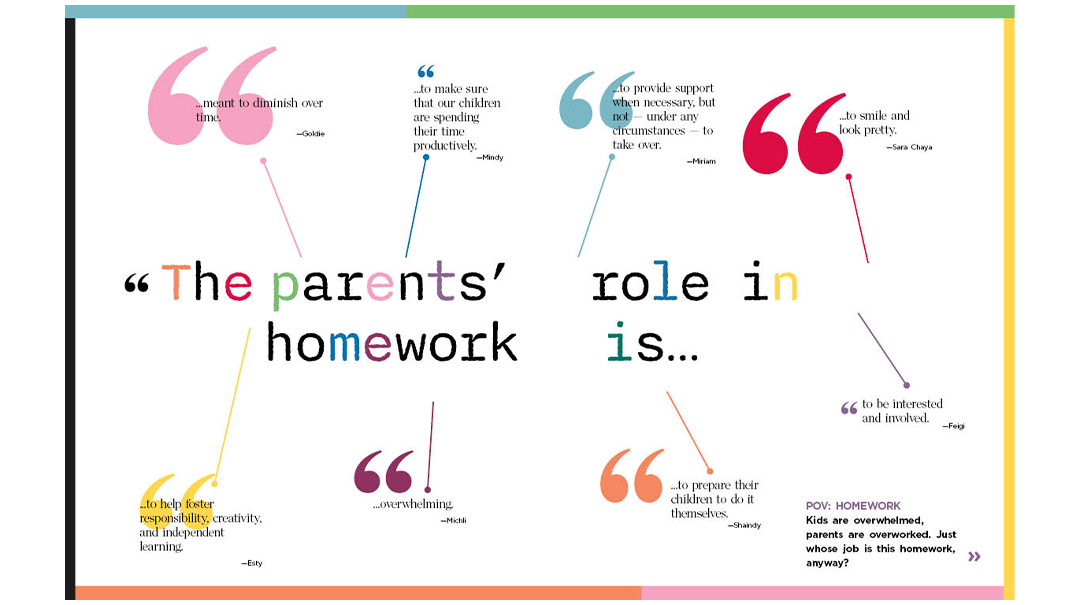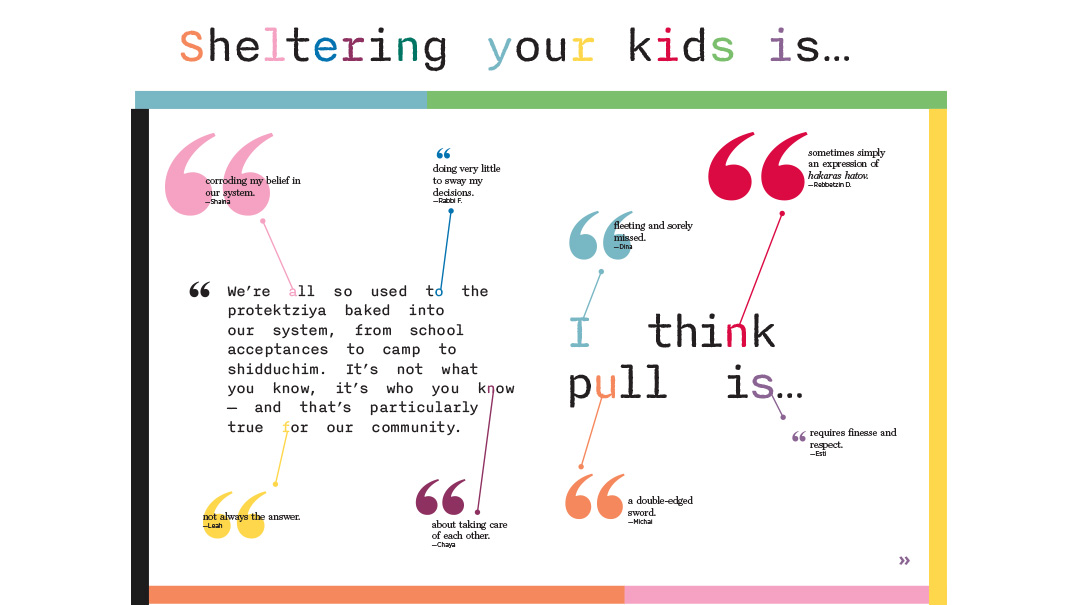The Parents’ Role in Homework Is…

Kids are overwhelmed, parents are overworked. Just whose job is this homework, anyway?

The parents’ role in homework is…
to help foster responsibility, creativity, and independent learning.
I’m a firm believer that in the grand scheme of things, my children shouldn’t feel like school exists to stress them out over getting the perfect grade. But that also comes from a place of privilege — Hashem blessed me with children who are strong academically and don’t need endless review to follow along in class. For that reason, I’ll remind everyone about homework once, maaaaybe twice, and then the child is responsible for their own work. I also believe in having a non-parent figure (homework helper, rebbi) step in to assist with homework if necessary. I don’t relish being a nag, and homework and nagging tend to go hand in hand. The only thing that’s a must in my house is quiet reading time before bed.
When it comes to projects, though, where there’s an opportunity for creativity and fun, I’m there. Let’s brainstorm, let’s sketch out models, and let’s buy fancy supplies if needed, because projects are awesome. I still remember my mother helping me sculpt a model of an American buffalo for a third-grade project (the silver foil core was key!) and I hope that one day, my kids will remember the things we work on together with the same fondness.
—Esty
The parents’ role in homework is…
overwhelming.
I have a love-hate relationship with my kids’ homework.
On one hand, I believe that assignments have the power to teach kids how to work toward a goal. Tests teach responsibility and give kids a taste of success. I don’t hate a little healthy, positive competition, as long as there’s no shame or judgment involved. I also feel that no homework is a shameful waste of growing brains, and kids who are bored are fine with a little stimulation and some minimally challenging schoolwork.
On the other hand, there’s so much going on at home during supper/homework/bedtime hours that I can’t give each child the proper attention they need to succeed. Looking back at some of my older kids, I wish I had more time when they were younger to teach them better study, reviewing, and note-taking habits. A few years ago, I hired a homework helper who comes two to three times a week to help my kids with their schoolwork. This has been a game changer. I can give my littlest kids necessary attention during that time and there’s no drama around homework and studying! (That’s huge.)
I think schools can be more mindful and creative in how they give homework. Reviewing several pesukim with each child requires a parent’s listening ear, whereas a review sheet that connects to the pasuk does not. Kids can be given homework that doesn’t require hours of focus time with a parent.
—Michli
The parents’ role in homework is…
to prepare their children to do it themselves.
I don’t think I’ve looked at my oldest’s homework since he was in second grade. My next one, though, is easily distracted and sometimes unmotivated. They’re bright kids, baruch Hashem, and they don’t need to do much work to succeed! But I also know that if I don’t push my daughter to review and do the work, she won’t build up good study habits.
I have no study habits. Somewhere around middle school, I decided that I didn’t care to work in school as long as everyone still thought that I was pretty smart. I put in effort once in a while, in subjects that I enjoyed, but otherwise, I was happy getting by with the A-/B+ of minimal effort from a bright student. But sometimes, I wonder if I cheated myself out of some greater understanding of math or physics. So I do encourage my daughter to study. For the first few tests of the year, I’ll even study with her, though it’s a long and agonizing process for us (and even more so for my husband, who gets bedtime duty for the little ones during the whole test week). But after that, she’s on her own. I can give her the tools she needs to do well. The rest is up to her
—Shaindy
The parents’ role in homework is…
to be interested and involved.
ATleast, when it comes to projects. This doesn’t mean that parents should do the project for the kid; rather, showing enthusiasm for what the child is working on in school encourages them to do their best. Unfortunately, many bright students don’t perform to their fullest potential because their parents are apathetic toward school initiatives.
The school works hard to get students excited about school programs and extracurricular activities. But it’s really up to the parents — if they roll their eyes, complain, or don’t express interest in these projects, they can’t expect their children to put in the effort to excel at them.
The parents’ role in homework is…
to smile and look pretty.
With gratitude to Hashem and my children’s schools, they don’t have a lot of homework. But even the little bit they do have (outside of kriah) is their responsibility — from first grade. Here’s my theory: Chinuch shouldn’t be outsourced, but teaching math absolutely should be. If you (the teacher) need my help with that, you haven’t done your job. And if you (the teacher) want students to do their homework, make the consequences significant enough that they won’t forget about it.
I had my own homework 25 years ago. Now I have other responsibilities, like keeping house, soothing boo-boos, serving supper, and, of course, putting siblings to sleep. As for homework — it’s the kids’ turn.
—Sara Chaya
The parents’ role in homework is…
to provide support when necessary, but not — under any circumstances — to take over.
I know mothers who deserve a mark of 100 percent for the work they produced, who pride themselves on being so dedicated that they went out of their way for their kid’s class presentation. They think of themselves as heroes, but they’re being unhelpful helicopters. The whole point of homework and projects is to teach children how to complete a task independently, how to think creatively, solve problems, and surprise themselves with their ability.
However, while some kids learn by working it out on their own, others, especially those with learning or executive-functioning deficits, will need step-by-step guidance for their first few projects or assignments. There’s no need to have immutable principles. If you see a kid is going to sink instead of learning to swim, you don’t leave them to sink. You teach them to swim.
—Miriam
The parents’ role in homework is…
meant to diminish over time.
IN first grade, we don’t expect our students to do homework completely alone. We know that they’ll need your help for projects and kriah and chazarah. But by the time they hit middle school, they should really be doing most, if not all, of their work on their own. If something is new and unfamiliar, they might need a helping hand for a bit. Maybe they’d like you there to test them on the material before an exam. But they shouldn’t need you.
I have students who will tell me that they couldn’t study for a test because their mothers were at a simchah the night before. But it isn’t their mothers who are taking the test, I remind them. Their mothers already did their time in middle school. A seventh or eighth grader should be capable of doing her own homework and studying most of the time. If she isn’t, then something is wrong. Maybe she needs extra support — a tutor or a class at a different level. Maybe, if the whole class is struggling, there’s an issue with the way that the teacher is imparting the material. But a child who still leans so heavily on her parents for homework support at an age when she’s learning independence in all other things is sending you a message. And it isn’t keep doing this indefinitely.
—Goldie
The parents’ role in homework is…
to make sure that our children are spending their time productively.
MY daughter isn’t the most academically focused student. She’s motivated to do well, but sometimes, the material is just too hard — either because she wasn’t taught it well or because it’s overly challenging — and I don’t think that it’s worth the frustration and stress and fighting that can ensue. So if she comes home at the end of the day and wants to spend time relaxing or being active or creative, I’m not going to make her stop that to sit and do homework.
Occasionally, I’ve had teachers who are upset about it. But I talk to so many parents whose children have intense anxiety over their grades and homework, and I feel very lucky that my daughter doesn’t. At the end of the day, I don’t think it matters that much. I want her to learn the middah of trying to do as well as she can, but if she wants to spend her time productively with other things, then I’m fine with that. I don’t believe in the whole mindset of “better grades will get you into a better high school, which will get you into a better seminary, which will get you a better shidduch.” I don’t want added stress in my house over it.
—Mindy
(Originally featured in Family First, Issue 919)
Oops! We could not locate your form.


